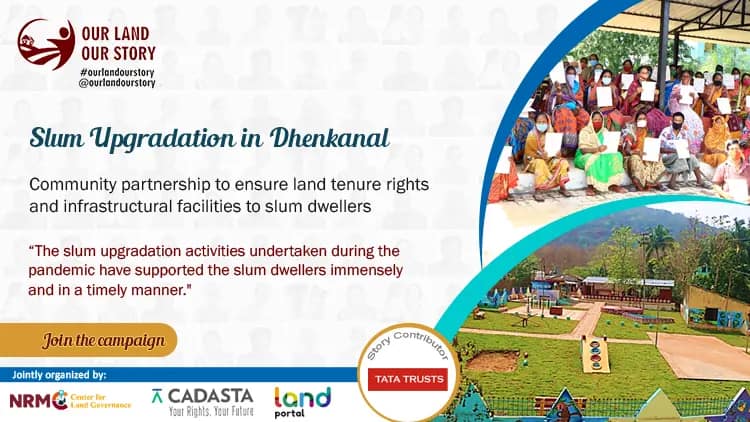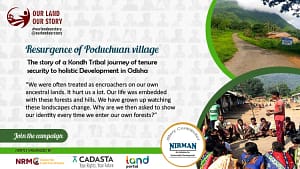
Community partnership to ensure land tenure rights and infrastructural facilities to slum dwellers
For the tens of millions of people living in the slums of India, a solution to the growing problem of urban poverty cannot come quickly enough. The story of this partnership has paved for a probable answer. The residents of Kathagada Parbatia Sahi, one of the slums in Dhenkanal city in eastern Indian state Odisha, led a difficult life, like in any other slums. The slum is home to 123 households, deprived of basic civic amenities, like piped water supply, access to proper road, sanitation, electricity, etc., making it difficult for the inhabitants. To add to the misery, the families lived in constant fear of eviction. City life wasn’t an easy life for the people in this slum. When the Tata Trusts Field Team including Jaga Fellows, along with officials from Dhenkanal Municipality, conveyed about the Government of Odisha’s decision under ‘Jaga Mission’ to support the slum dwellers by providing land tenure security and ensuring basic infrastructural facilities in the slums, it was hard for the community to believe. To them, it seemed like another empty promise.
Intensive workshops and awareness meetings were organised. Participatory need assessment was organised to undertake assessment of services and infrastructure gaps. The members of Slum Dweller Association (SDA) of Kathagada Parbatia Sahi were imparted with extensive capacity building training to act as the Implementing Partner (IP) and monitor the execution of infrastructure development works including quality check. Frequent and regular engagement with the community helped in building trust and strong partnership.
As a response to the COVID pandemic, the Government of Odisha initiated the country’s first wage employment scheme known as MUKTA to provide livelihood opportunities to urban poor. The scheme focussed on promoting community driven construction instead of the contractor model, which enabled Slum Dwellers Associations (SDA) to undertake all the development works in the slums, ensuring livelihood opportunities to people who were grossly affected during the pandemic. The SDAs act as ‘Implementing Partners’ and wages are directly transferred to the beneficiary account through DBT (Direct Bank Transfer) mode, ensuring transparency and timely pay-out. Under the scheme the implementing partners are entitled to get 7.5% of the project cost towards their supervision charges. This has provided opportunity for the skilled and unskilled labourers from the slum to earn their livelihoods.

In Kathagada Parbatia Sahi, out of a total 123 Households, 120 households are granted Land Rights and Entitlement Certificates, the pavers block road and covered storm water drain constructed throughout the slum, individual and public toilets are constructed, 23 street lights are erected and every household are supplied with piped drinking water and electricity. An open space developed with a badminton court, equipment for exercises for all age groups, and kids’ play equipment like swing, seesaws, slides etc. A multipurpose community centre,- PARICHAYA, was constructed adjacent to the open space for community gathering.
Mr. Ashok Kumar Rout, Secretary of the Kathagada Parbatia Sahi Slum Dwellers Association (SDA), expressed appreciation on behalf of the community, “The slum upgradation activities undertaken during the pandemic have supported the slum dwellers immensely and in a timely manner. A sigh of relief was let out by the families who were facing financial difficulties due to loss of jobs and employment during COVID-19. The consistent engagement of the Tata Trusts’ team and Officials from Dhenknal Municipality, with the SDA, has built our confidence to take up various development activities even outside the slums.”
Dense in population, the slums and informal settlements emerged as a major challenge for the spread of Corona virus. The well-designed public spaces developed under Odisha Liveable Habitat Project in informal settlements have given possible solutions by promoting public safety, and improving aesthetics of the slums. In Kathagada Parbatia Sahi, slum lighting of open spaces and streets and other upgrades within slums are making neighbourhoods safer. It is helping to ease overcrowding and, promote healthier lifestyles during this pandemic time.
Kathagada Parbatia Sahi transformation story validates the potential of strong partnerships. In the present case, the partnership by design, intends to position communities at the centre of the process. This close community participation has helped ensure transparency of the process and significantly increased the speed of implementation. This is now replicating in about 3000 slums of Odisha enabling slum dwellers in strengthening their land security and transferring their own slums into liveable habitats.
Story contributed by





